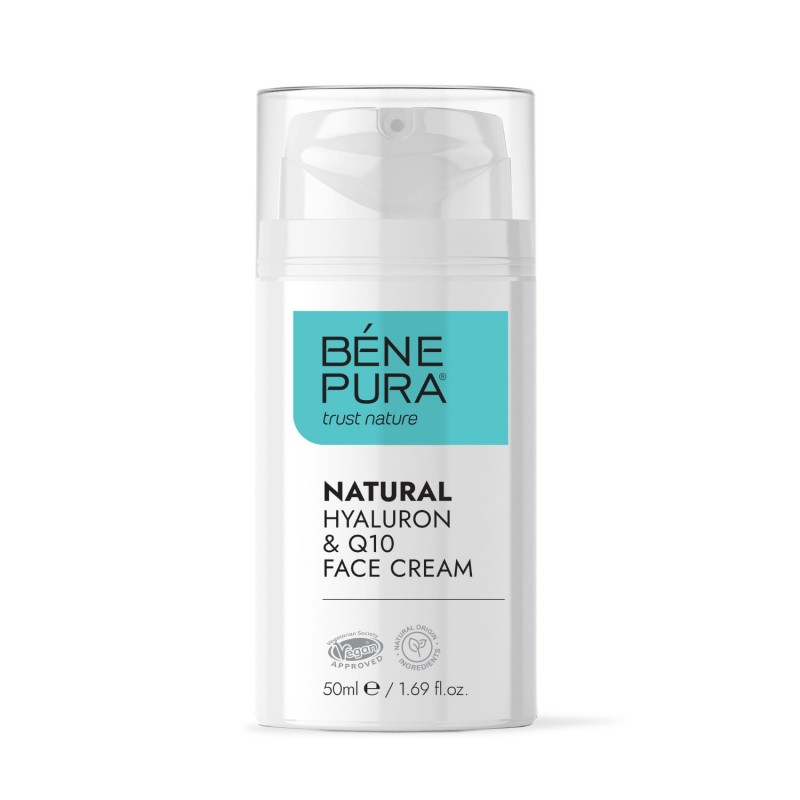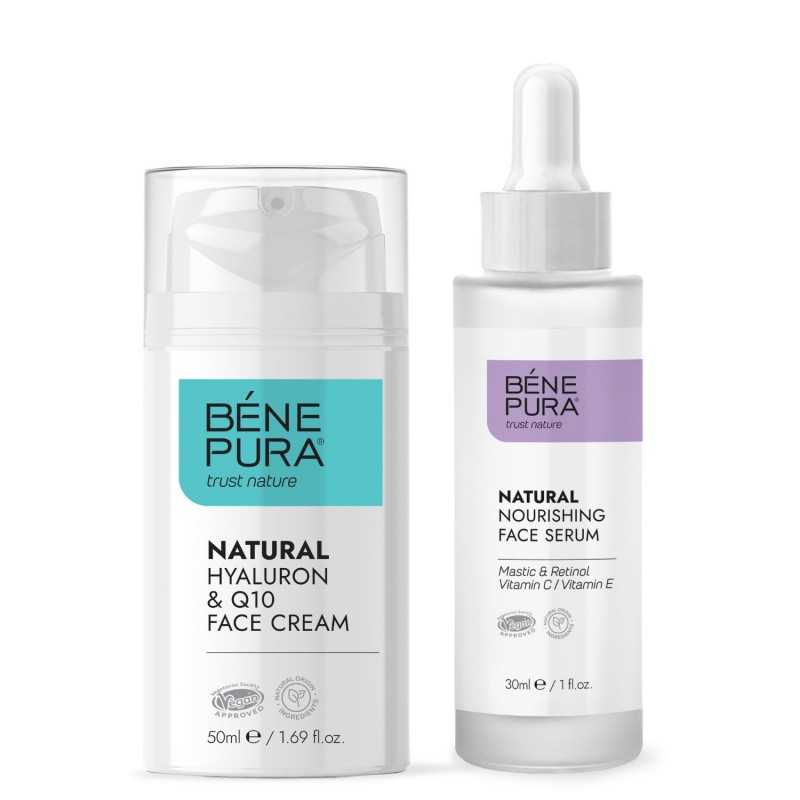How does Coenzyme Q10 Improve Heart, Brain and Skin Health?
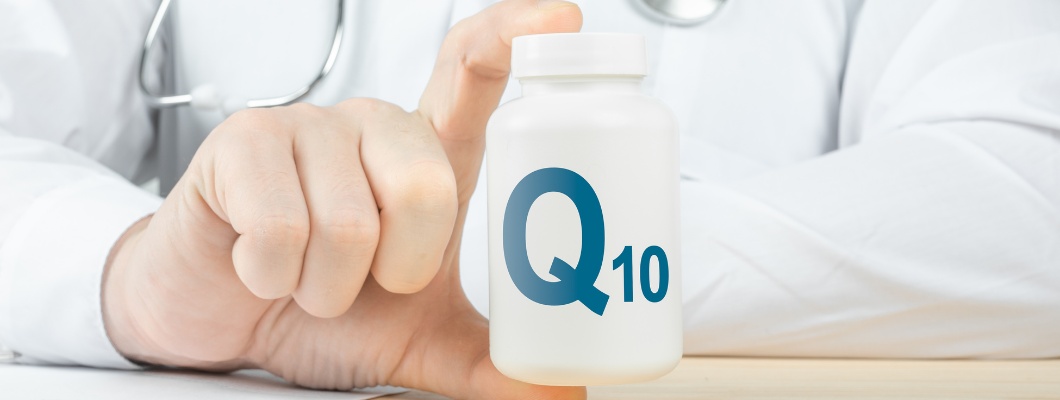
Coenzyme Q10 (CoQ10) is one of the most important compounds for the human body, participating in energy production and protecting cells from oxidative stress.
It is found in every cell and is especially concentrated in organs with high energy needs such as the heart, brain and muscles.
Although the body naturally synthesizes CoQ10, its levels decline with age which can lead to decreased energy, a weakened immune system and accelerated aging.
In this article we will take a detailed look at the role of Coenzyme Q10, its health benefits, its application in cosmetics and how to take it for maximum effect.
Table of Contents
1. What is Coenzyme Q10?
Coenzyme Q10 (CoQ10) occurs naturally in the body, playing a vital role in the energy metabolism of cells.
It belongs to the group of ubiquinones - compounds that can participate in redox reactions by accepting and donating electrons.
Thanks to this function, CoQ10 is a key factor in cellular respiration and the synthesis of adenosine triphosphate (ATP) - the main energy source for cells.
Coenzyme Q10 has a dual function - it not only helps produce energy but also acts as an antioxidant. This means it protects cells from oxidative stress and damage caused by free radicals.
- Oxidative stress is a major factor in cellular aging and the development of various diseases, including cardiovascular problems and neurodegenerative disorders;
- CoQ10 plays an important role in maintaining the cell membrane and the stability of the lipids within it;
- It helps maintain cellular integrity and functionality which is essential for the proper functioning of all organs and systems in the body.
2. Why is Coenzyme Q10 so Important?
Coenzyme Q10 (CoQ10) is a vital compound that is involved in energy production and protects cells from oxidative stress. Insufficient amounts of CoQ10 in the body can lead to a number of negative health consequences affecting various organs and systems.
Coenzyme Q10 deficiency leads to:
1. Chronic fatigue and lack of energy
CoQ10 plays a key role in the production of adenosine triphosphate (ATP), which is the main energy source for cells.
When CoQ10 levels are low, cells cannot produce enough energy leading to feelings of constant fatigue, exhaustion and reduced physical endurance.
This condition is commonly seen in older people and in patients with diseases such as fibromyalgia and chronic fatigue syndrome.
2. Impaired cardiovascular health

The heart is the organ with the greatest energy needs and relies heavily on Coenzyme Q10 for its proper functioning.
CoQ10 deficiency can lead to:
- Increased risk of heart failure, as the heart muscle cannot work effectively;
- Increased blood pressure, as CoQ10 helps dilate blood vessels;
- Increased levels of oxidative stress, which damages arteries and increases the risk of atherosclerosis and heart attack.
Studies show that people with chronic heart failure often have significantly lower levels of CoQ10 in the body.
3. Cognitive problems and accelerated brain aging
The brain is extremely sensitive to oxidative stress and requires a constant supply of energy.
Insufficient CoQ10 can lead to:
- Impaired memory and concentration;
- Increased risk of neurodegenerative diseases such as Alzheimer's and Parkinson's;
- Faster cognitive aging and reduced mental clarity.
People suffering from neurodegenerative diseases often have low levels of CoQ10 which can accelerate the progression of these conditions.
4. Muscle weakness and pain
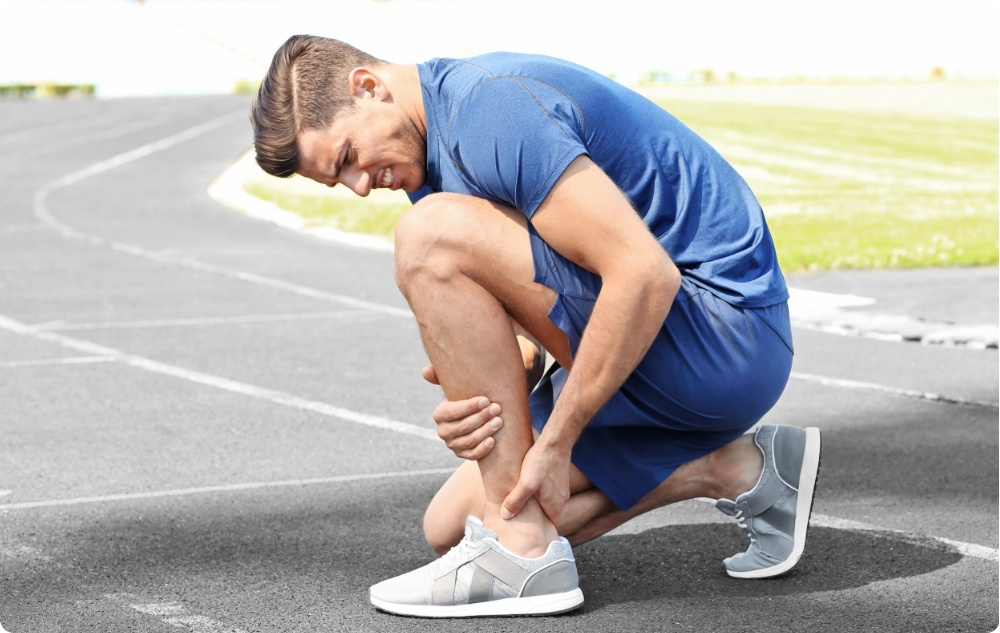
Muscle cells also need energy, and insufficient CoQ10 can lead to:
- Reduced physical strength and muscle weakness;
- Increased risk of muscle cramps and pain;
- Slower recovery after physical exertion.
Taking statins (cholesterol-lowering drugs) can significantly reduce CoQ10 levels, often leading to muscle pain as a side effect.
5. Weakened immune system
CoQ10 supports the energy metabolism of immune cells which are responsible for protecting the body from viruses and bacteria.
Low levels of CoQ10 can lead to:
- More frequent infections and colds;
- Slower recovery from illnesses;
- Increased risk of chronic inflammatory conditions.
6. Hormonal imbalance and reproductive problems
CoQ10 plays a role in hormone synthesis and maintaining the health of eggs and sperm.
Low levels can cause:
- Reduced fertility in men and women;
- Hormonal disorders and irregular menstrual cycles;
- Faster aging of reproductive cells.
Women over 35 often have lower levels of CoQ10 which can affect egg quality.
7. Slow metabolism and weight gain

CoQ10 is involved in energy metabolism and its deficiency can slow down the metabolism.
This leads to:
- Easier fat accumulation;
- Difficulty burning calories even with physical activity;
- Increased risk of insulin resistance and metabolic syndrome.
8. Increased oxidative stress and premature aging
CoQ10 is a powerful antioxidant that protects cells from damage.
Its lack accelerates the aging process and leads to:
- Increased wrinkle formation and loss of skin elasticity;
- Faster accumulation of cellular damage, which can lead to chronic diseases;
- Reduced ability of the body to recover from injury.
9. Reduced body detoxification
The liver relies on CoQ10 to process toxins and medications.
Low levels of CoQ10 can cause:
- More difficult elimination of toxins from the body;
- Increased risk of accumulation of harmful substances and oxidative stress in the liver;
- Increased sensitivity to pollutants and heavy metals.
3. Coenzyme Q10 in Cosmetics
Coenzyme Q10 is among the most effective ingredients in the cosmetic industry thanks to its antioxidant and regenerating properties. It plays a key role in combating skin aging, protecting it from external aggressors and supporting cellular metabolism.
With age, Coenzyme Q10 levels in the skin decrease leading to loss of elasticity, the appearance of wrinkles and an uneven complexion.
Incorporating CoQ10 into cosmetic products helps maintain healthy, youthful and radiant skin.
How does Coenzyme Q10 affect the skin?
CoQ10 penetrates the deep layers of the skin where it stimulates the production of collagen and elastin - the two main proteins responsible for its firmness and smoothness.
It accelerates cell regeneration and helps the skin recover faster from harmful influences such as solar radiation and pollution.
1. Fights free radicals
Free radicals are the main culprit for premature skin aging.
Coenzyme Q10 neutralizes these harmful molecules, thereby reducing inflammation, slowing the aging process and preventing loss of moisture and vitality.
2. Improves energy balance in the skin

Skin cells need energy to perform their functions effectively.
CoQ10 supports energy production in cells, leading to healthier and more radiant skin with reduced signs of fatigue and stress.
3. Protects the skin from harmful external factors
Daily exposure to UV rays, pollution and toxins accelerates the breakdown of skin structures and leads to premature wrinkles.
Coenzyme Q10 acts as a natural shield that strengthens the skin's protective barrier and reduces the harmful effects of the environment.
4. Regulates melanin production
CoQ10 has the ability to regulate melanin production, making it useful in combating age spots and uneven skin tone.
Regular use of products with Coenzyme Q10 can lead to a more even and fresher appearance of the skin.
5. Fights the signs of aging
The skin around the eyes is extremely thin and sensitive making it susceptible to the appearance of wrinkles and dark circles.
Coenzyme Q10 helps improve microcirculation in this area, reduces puffiness and brightens the look.
6. Stimulates hair growth
In addition to the skin, CoQ10 also has a beneficial effect on the hair. It nourishes the scalp, improves blood circulation and stimulates the growth of healthy and strong hair.
Coenzyme Q10 not only maintains youthful skin but also provides comprehensive care for its structure and health. Including it in your daily skin and hair care routine can lead to long-lasting and visible improvements.
4. How to Take Coenzyme Q10?
Proper intake of Coenzyme Q10 is essential for maximum effectiveness. Since this compound is fat-soluble, the route of administration and the form of the supplement play an important role in its absorption by the body.
What should the daily dose be?
The recommended daily dose of Coenzyme Q10 depends on age, health condition and individual needs:
- For general health maintenance: 30-100 mg daily;
- For cardiovascular disease: 100-200 mg daily;
- For sports and energy support: 100-300 mg daily;
- When taking statins (cholesterol medications): 100-200 mg daily;
- For the treatment of neurodegenerative diseases: 200-400 mg daily.
It is always advisable to consult a doctor before starting treatment especially if you have chronic diseases or are taking medications.
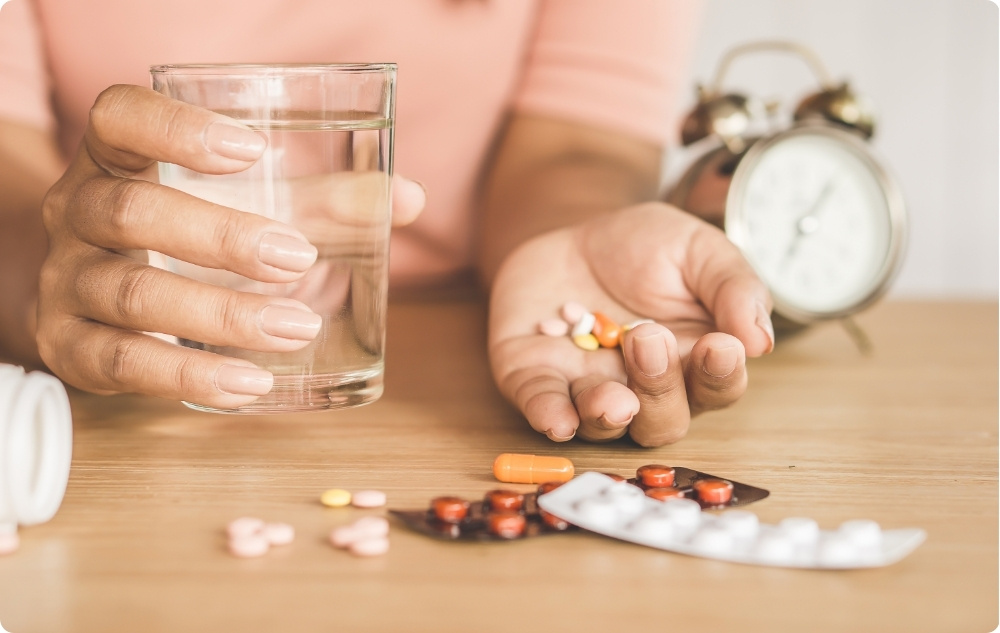
What is the best time to take Coenzyme Q10?
Coenzyme Q10 is fat-soluble which means it is better absorbed when taken with a meal rich in fat.
The best time to take it is during a meal, especially lunch or dinner, when the food contains enough fat for optimal absorption.
If you are taking higher doses (over 200 mg daily) it is recommended to divide them into two doses - morning and evening - to maintain stable levels in the body.
Which form of Coenzyme Q10 should we choose - Ubiquinone or Ubiquinol?
Coenzyme Q10 comes in two main forms:
- Ubiquinone (oxidized form): This is the standard form that the body must convert to the active ubiquinol. It is cheaper but has lower bioavailability;
- Ubiquinol (reduced form): This form is biologically active and more easily absorbed, especially in people over 40 or with impaired ability to convert ubiquinone.
When choosing a supplement it is important to consider age and individual needs - older people and those with health problems often benefit more from ubiquinol.
How long does it take to feel the effects of taking Coenzyme Q10?
The effects of taking Coenzyme Q10 are not felt immediately. It usually takes between 2 and 8 weeks of regular intake to see noticeable improvements in energy levels, heart health or physical endurance.
For chronic conditions it may take several months to see the full benefits.
5. Side Effects of Using Coenzyme Q10
Coenzyme Q10 is a naturally occurring compound in the human body and is generally considered safe when taken appropriately. However, some people may experience side effects or have specific contraindications to its use.
Understanding its potential side effects and drug interactions is important to avoid unwanted consequences:
1. Possible side effects
Although most people tolerate Coenzyme Q10 well, in rare cases the following side effects may occur:
- Gastrointestinal upset - sometimes taking CoQ10 can cause nausea, stomach pain, heartburn, diarrhea or loss of appetite. This usually occurs at high doses and can be avoided by taking it with food;
- Headache and dizziness - some people report a mild headache or feeling dizzy, especially in the first few days of taking it;
- Insomnia - taking Coenzyme Q10 late in the day can cause difficulty falling asleep. To avoid this effect it is recommended to take it in the morning or at lunchtime;
- Allergic reactions - In rare cases skin rashes, itching or other allergic manifestations may occur, especially if the supplement contains additional ingredients to which a person is intolerant.

2. Drug interaction
Coenzyme Q10 may interact with some medications which can enhance or weaken their effects.
- Statins (cholesterol medications) - these medications reduce the body's natural production of CoQ10 so supplemental intake is often recommended to compensate for losses;
- Blood pressure medications - CoQ10 may enhance the effect of antihypertensive medications which may lead to excessive lowering of blood pressure;
- Blood thinners (warfarin, aspirin) - CoQ10 may reduce the effectiveness of anticoagulants which may increase the risk of blood clots;
- Chemotherapy medications - studies have shown that CoQ10 may affect the effectiveness of certain chemotherapy drugs so it is important for people with cancer to consult a doctor before taking it.
3. Reception and contraindications
Coenzyme Q10 is not suitable for everyone especially for certain health conditions.
In the following cases you should consult a doctor before taking Coenzyme Q10:
- Pregnancy and breastfeeding - although CoQ10 is a natural substance, there is not enough scientific data on its safety during pregnancy and breastfeeding so it is not recommended to take it without medical approval;
- People with low blood pressure - Coenzyme Q10 can lower blood pressure and lead to too low values in people who already suffer from hypotension;
- People undergoing surgery - CoQ10 can affect blood clotting so it is recommended to stop taking it at least two weeks before planned surgical interventions.
How to minimize the risk of side effects?
To avoid adverse reactions it is important to follow several basic recommendations:
- Start with a low dose - if you have not taken CoQ10 before, start with a lower dose (30-50 mg daily) and gradually increase if necessary;
- Take with food - this not only improves absorption but also reduces the risk of stomach upset;
- Divide the daily dose - if you are taking high amounts (over 200 mg), divide them into two doses (morning and afternoon) to avoid possible side effects;
- Monitor your body's reaction - if you notice side effects, reduce the dose or stop taking it and consult a doctor.
6. Conclusion
Coenzyme Q10 is a key compound that supports energy production, protects cells from oxidative stress and plays an important role in cardiovascular, brain and skin health.
With age and certain diseases its levels decrease, which can lead to fatigue, weakened immunity and skin aging.
Consuming CoQ10 through foods or supplements can help maintain optimal levels but it is important to follow the correct dosages and take individual needs into account.
For maximum effectiveness and safety, consultation with a doctor is recommended especially in case of chronic diseases or taking medications.
SOURCES:
1. Healthline: 9 Benefits and Side Effects of Coenzyme Q10 (COQ10) (18.04.2025)

